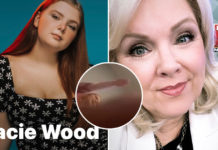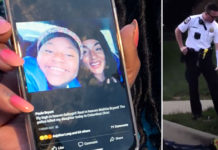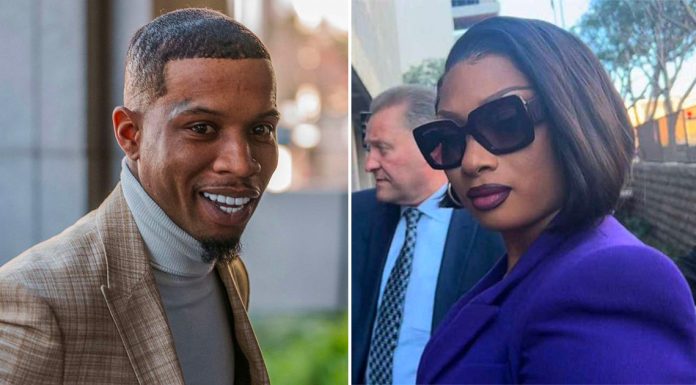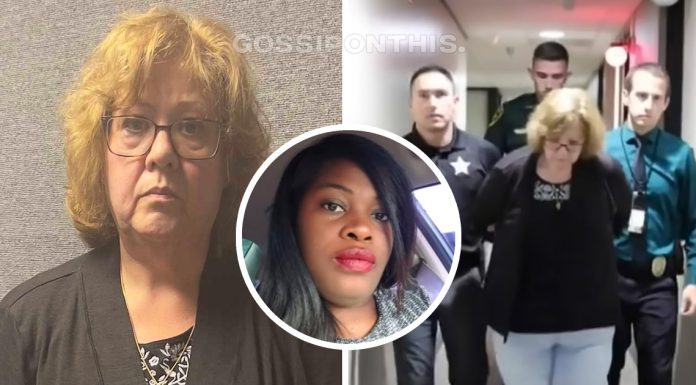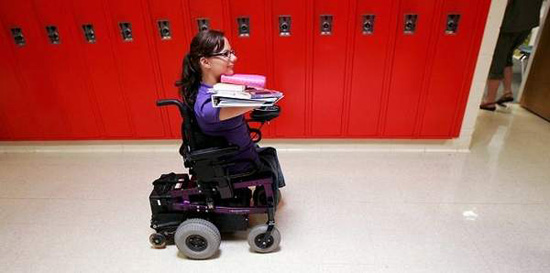
A disabled 16-year-old girl born with no arms and no legs says she was discriminated against during cheerleading tryouts.
She’s been trying to make her high school squad for the past three years, but her parents say she was given “no accommodation for her disability” during tryouts, citing the Americans with Disabilities Act.
According to the Omaha World-Herald, the girl received her “lowest score in the jumps/kicks category and her highest marks in the communication kills and enthusiasm/spirit categories.” (Insert **blank stare** here).
Read more below:
She likes to dance. She wants to get people excited for games. She has friends on the cheerleading squad.
“I just think it would be fun,” the 16-year-old said.
So she’s practiced. Her older sister, a former cheerleader, helped her figure out ways she could cheer from her wheelchair. Julia, who’ll be a junior at Aurora High School this fall, was born without legs and with arms that stop short of her elbows.
This spring, for the third time, she tried out to be a cheerleader. For the third time, she didn’t made the squad.
Last month, she and her parents, Mike and Carolyn Sullivan, asked the Aurora school board to correct what they see as “scoring errors” in her tryout evaluations this spring, saying she was given no accommodation for her disability.
Their attorney cited the Americans With Disabilities Act and other federal laws that prohibit discrimination against people with disabilities. They also asked the board to adopt policies specifying that such discrimination won’t be tolerated and that the district will make accommodations to avoid it.
On Monday, the board declined to take up the matter after meeting in closed session.
Aurora Superintendent Damon McDonald said school administrators and the school board reviewed the district’s policies and criteria for the cheerleading program with its legal counsel. They also sought a second legal opinion.
“In both cases, they came back and said the Aurora Public Schools policies and guidelines are appropriate and legitimate for all students,” said McDonald, who took the job July 1.
The school district, he said, does not believe that there was a violation of the disabilities act and that making accommodations “would fundamentally alter the cheerleading program in the Aurora Public Schools.”
Kevin Schneider, a Lincoln attorney representing the Sullivans, said the policy of treating everyone equally is inappropriate when it comes to someone who has a legally recognized disability.
“We would agree that there are some activities such as football where the ability to run and tackle are fundamental to the sport,” he said. “Making reasonable accommodations and modifications for cheerleading are not fundamental in that same way.”
He also said there is a difference between a legally recognized disability, such as having no legs, and normal differences in human performance, such as coordination.
Amy Miller, an attorney for the ACLU of Nebraska, also argued for the need to accommodate students with disabilities in a July 1 letter to the board.
The state organization has posted a podcast about Julia’s case on its website.
Mike Sullivan said the family didn’t know in past years how the cheerleading tryouts were scored. After this spring’s tryouts, they asked.
Sullivan said the outcome of the school board meeting was frustrating. “For us, it’s the basic principle,” he said. “Any handicapped child in Nebraska could be kept out of activities.”
Schneider, the attorney, said in a statement that the family tried to resolve the matter privately with district administration. The Sullivans, he noted, are “grateful” for the Aurora community and for the school district and “did not want a public dispute.”
But Schneider wrote that the family recognizes that the matter “can have far-reaching implications, not just for Julia and their family, but for many others as well.”
A decade ago, pro golfer Casey Martin sued the PGA Tour for the right to use a golf cart in competition, a case he won in the U.S. Supreme Court.
In Nebraska, cheerleading is not sanctioned by the state’s governing body for high school activities.
For state-sanctioned high school sports, schools don’t necessarily have to lower standards, but they do have to make special accommodations under the disabilities act, said Jim Angele, assistant director of the Nebraska School Activities Association.
The state governing body does review prosthetics used by high school athletes to make sure they won’t harm other players. Usually, that’s not a problem.
Schneider laid out the family’s requests in a June 9 letter to the school board. He also detailed the steps they had taken to try to resolve the issue.
The sponsor of the program, he wrote, asked administrators before last spring’s tryouts what accommodations should be made for Julia. The sponsor was told Julia was to be judged in the same way as other participants. Three tryout judges were given the same instructions. Seventy-five percent of a participant’s score was based on physical activities. Twenty-five percent was based on teacher evaluation.
In the performance portion, Julia received her lowest score in the jumps/kicks category and her highest marks in the communication skills and enthusiasm/spirit categories.
Not that cheerleading is Julia’s only interest.
Julia participates in marching band and pep band. She’s been practicing for the marching band over the summer. She hangs a cymbal from her chair, drives with one arm and strikes the cymbal with the other. She attaches drumsticks or mallets to her arms.
She took dance lessons for 10 years, sitting on the floor, placing shoes on her arms and tapping out rhythms on the floor. For cheerleading, she sits in her wheelchair to spin and dance.
Her friends and family help her with some things, she said, but she’s pretty independent. She’s a member of the Nebraska Youth Leadership Council, a group of youths who advocate for people with disabilities.
Mike Sullivan said he doesn’t yet know where the family will go from this point.
Julia knows what she wants to happen. She wants people to recognize that she can do it.
“They haven’t seen me,” she said. “They just have it in their mind that I can’t do it.”
[OWH]
We believe in equal opportunities and all of that good stuff … but sometimes when the odds are against you, you just need to find another interest or hobby. #Thatisall.


